Today, the trial against former Head of Military Intelligence José Mauricio Rodríguez Sánchez is expected to reach a verdict. As a key player under Efraín Ríos Montt’s 1982-1983 dictatorship in Guatemala, Rodríguez Sánchez stands accused of genocide and crimes against humanity against the Ixil people. Over the past year, we have seen important cases advance that shed light on the central role military intelligence played in making this level of systematic violence possible. In May, another former head of military intelligence, Manuel Callejas y Callejas, was found guilty of aggravated sexual assault and crimes against humanity for the 1981 forced detention and rape of Emma Guadalupe Molina Theissen and the subsequent forced disappearance of her 14-year-old brother, Marco Antonio. Today, if Rodríguez Sánchez is found guilty, it will be the first time in Guatemala’s history that a member of military intelligence will be convicted of genocide.

Former Head of Military Intelligence José Rodríguez Sánchez listens to closing arguments in the genocide trial. Credit: CALDH Twitter
Creating an internal enemy and improving operational efficiency: Rodríguez Sánchez is GUILTY by commission
Military intelligence collects and parses the information needed to create military plans, including the very classification of who is considered the enemy. While Rodríguez Sánchez was head of intelligence, he helped develop and operationalize military plans that classified 100 percent of the Ixil population as subversives. Gathered military intelligence identified no more than 60 guerilla fighters in the entire Ixil region, yet those plans provided the blueprints for targeting an entire group of people with the goal of complete annihilation. During the trial, expert testimony demonstrated that classifying the Ixil people as an internal enemy had nothing to do with attacking guerrillas within the confines of an internal armed conflict, but instead, was based in a long history of racism. Prior to the armed conflict, plantation owners involved in exploitative labor practices refused to hire Ixil workers, labeling them “difficult” and “subversive” because they had organized for better conditions. When the conflict began, military intelligence gathered information from many of those same plantation owners to classify the entire Ixil population as leftist guerilla sympathizers who should be eradicated.
After identifying the enemy, intelligence also increased operational effectiveness, giving soldiers information on communities’ vulnerabilities. They gathered information on community life and started to carry out violence on market days or during church services, when intelligence told them that large groups of people would be gathered in one place. They gathered information on the location of community leaders and their families, and targeted them for forced disappearance, and learned where communities kept crops and livestock, taking them away from massacre survivors and ensuring more supplies for the army itself.
As part of a political strategy under Ríos Montt’s dictatorship, massacre survivors were given food and medical aid to try to create local sympathizers among the Ixil people. They were then organized into Civil Defense Patrols (PAC) and forced to report on others in their community. This provided a wealth of intelligence to the military on daily life in the Ixil region, while also seeding distrust among its inhabitants.
According to military manuals, the entire network of sources – military commissioners, intelligence officers, collaborators, PAC, and more – provided information to Rodríguez Sánchez as the head of military intelligence. He received and interacted with this information almost as soon as it was collected and was tasked with deciding what was useful to inform and improve planning and operations. Those same manuals prove that the information that Rodríguez Sánchez disseminated carried weight: given the hierarchical structure of the military, his orders were considered conclusions to be put into action, rather than mere recommendations. This distinction shows that Rodríguez Sánchez did indeed have and use the capacity to plan and shape the genocide and crimes against humanity committed against the Ixil people.
Knowing all, but not acting to stop genocide: Rodríguez Sánchez is GUILTY by omission
As a high-ranking military official, Rodríguez Sánchez also held responsibility for denouncing human rights abuses. Declassified military intelligence reports show that Rodríguez Sánchez had real-time knowledge of the many military activities that constituted genocide and crimes against humanity, including:
- Widespread and indiscriminate massacres of men, women, children, and the elderly
- Specific targeting of pregnant women and young children as the seed of future generations
- Destruction of homes, livestock, food, and medical supplies
- Forced displacement and the continuous pursuit and persecution of survivor populations
- Forced conscription into Civil Defense Patrols and forced relocation of communities into model villages
- Separation of children from their communities and cultures
- Systematic sexual abuse and rape
- Interrogations, torture, and the use of extrajudicial killings against those captured
The mere fact that he had all of the evidence of the many crimes being committed against the Ixil people over the course of the Ríos Montt regime and did nothing means that Rodríguez Sánchez is responsible. In the final days of the trial, however, the prosecution offered even more evidence: a formal recognition by the military of the key role Rodríguez Sánchez played in successfully carrying out a cornerstone military strategy – Plan Victoria 82. Not only did Rodríguez Sánchez fail to stop genocide, he received military recognition for actively and successfully participating in its planning and execution.
The long shadow of military intelligence
Today, the need to expose the use of military intelligence in carrying out acts of violence remains essential – both in Guatemala and in the United States where dozens of high-ranking military officials accused of committing crimes against humanity across Latin America and the world were trained. While the 1996 signing of the Peace Accords officially ended Guatemala’s 36-year internal armed conflict, many former members of military intelligence took up posts in the subsequent civilian governments and assumed other powerful roles in society. Many of these military officials had advocated for an end to the armed conflict, recognizing the power military intelligence would still hold in a post-war society.
Former President Otto Pérez Molina stands accused of authoring the murder of Bishop Juan Gerardi and Efraín Bamaca, while he headed military intelligence from 1992 – 1993, and is accused of carrying out acts of extreme violence as a military commander in the Ixil region during the genocide. In 2015, he stepped down from the presidency and was indicted on charges of corruption for his involvement in La Línea – a criminal network accused of stealing millions of dollars from the Guatemala state. Likewise, former Head of Military Intelligence Manual Callejas y Callejas, found guilty of crimes against humanity in the Molina Theissen case, is also implicated in La Cofradía – a type of clandestine parallel state structure started by military intelligence officials under the Lucas García presidency.
The connections between military intelligence and organized crime continue to have ramifications for social movements. Under the leadership of Pérez Molina, the government reportedly purchased and began using an Israeli technology designed to infiltrate citizens’ phones and social networks. This level of surveillance is only one example of the legacy of military intelligence and has significant implications in a country where 21 human rights and environmental defenders have already been killed in 2018.
Work towards justice reshapes the legacy of violence
While both the legacy of military intelligence and its current day practices continue to affect social justice organizing, communities continue in their decades-long fight against impunity and work towards a more just society. Facing threats along the way, they have made incredible progress in prosecuting many of the material and intellectual authors of genocide, systematic sexual violence, and forced disappearance, and have achieved convictions against many people previously considered to be untouchable – from Ríos Montt to Benedicto Lucas García to Manuel Callejas y Callejas. This ongoing struggle for justice and memory helps change the legacy of the conflict. Accompany us on social media as we report from inside the courtroom today and stand with survivors in their fight for justice.

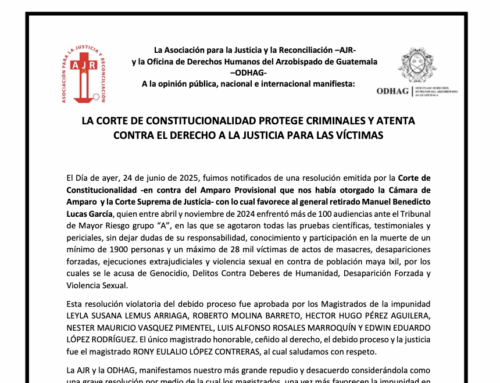
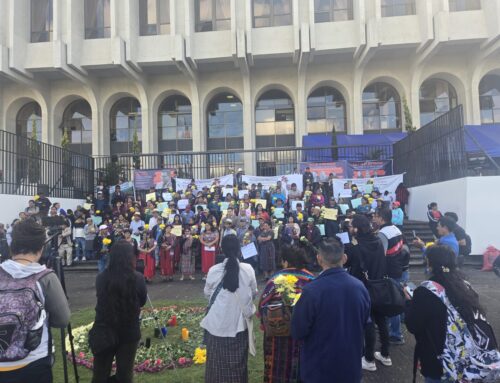
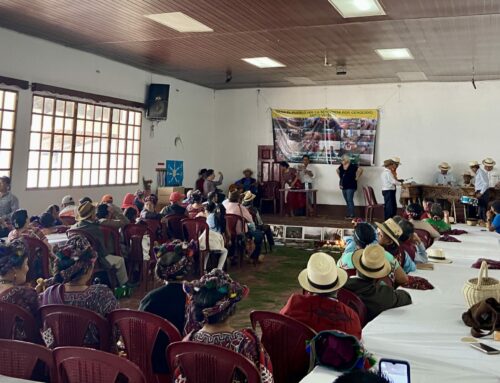
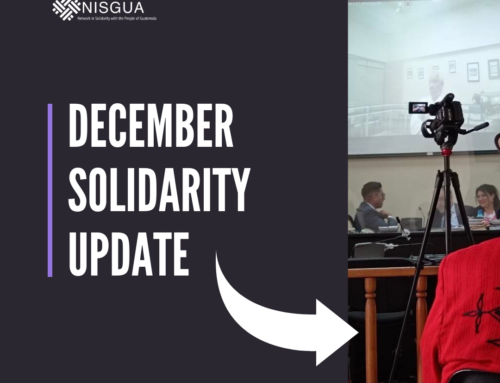
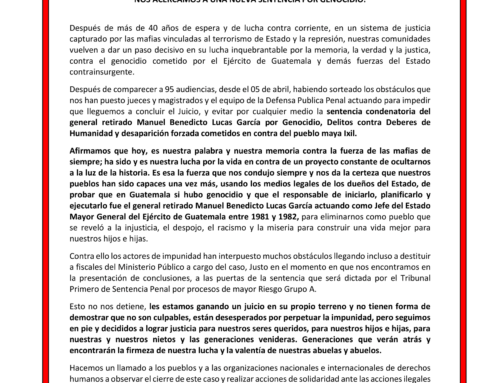
Leave A Comment